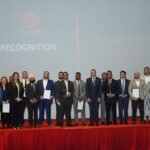Doha, 30 Nov. 2019
Doha International Conference on “Social Media: Challenges and Ways of Supporting Freedoms and Protecting Activists” will be held on February 16-17, 2020.
The conference is arranged in cooperation with Office of United Nations High Commissioner for Human Rights, European Parliament, Global Alliance of National Human Rights Institutions and the International Federation of Journalists.
Dr Ali bin Smaikh al-Marri, Chairman, NHRC has said that 300 governmental and non-governmental organisations, journalists’ unions, major companies and social networks including Google, Facebook and Twitter, international celebrities and human rights defenders, media practitioners, international experts and representatives of the technology community, relevant special rapporteurs, chairpersons of United Nations treaty bodies, judges, lawyers and representatives of victims of social media activists will also participate, in addition to international and regional human rights mechanisms, national human rights institutions, research centres and other relevant bodies and organisations.
In a press release issued by NHRC, Dr Al-Marri said that the conference aims to discuss the opportunities created by social media to promote human rights, and explore the repeated forms of interference in the use of these means. The discussions will identify good practices and lessons to benefit from social media in realising human rights, explore the impact of online speech restrictions set by national laws and policies on journalists, human rights defenders, political activists and social media influencers, besides discussing the application of provisions on incitement to hate in practice and the use of social media platforms to incite and spread hate speech, including against religious minorities.
He pointed out that social media platforms have changed the prevailing concepts in the cultural, political and media communication in the world, and digital devices have become mobile newsrooms, and that there is no obscure access to the other easily, where the scope of opportunities for the exercise of fundamental
rights and freedoms of expression and assembly association and participation in public life is unparalleled.
The rapid expansion of the digital communications infrastructure and the advancement of digital technology had brought about profound social change, posing challenges and opportunities for human rights and civic space, he added. Dr al-Marri noted that the protection of human rights now and in the future is increasingly dependent on the ability to clarify how human rights principles are applied to social media, and to take advantage of those platforms, which have become an indispensable tool for realising a range of human rights and promoting economic and social development.
“New technologies and interdependence have helped the growth of civil society networks, including cross-border growth. However, the emergence of these new opportunities has been followed by emerging threats to civic space. At the same time, digital technologies have also created new excuses for governments to stifle social media activity and restrict civil space, often based on security pretexts,” he said. Over the years, governments and other groups struggling to assert
their dominance in public debate have tried to interfere with social media in many different ways, Dr AlMarri said









